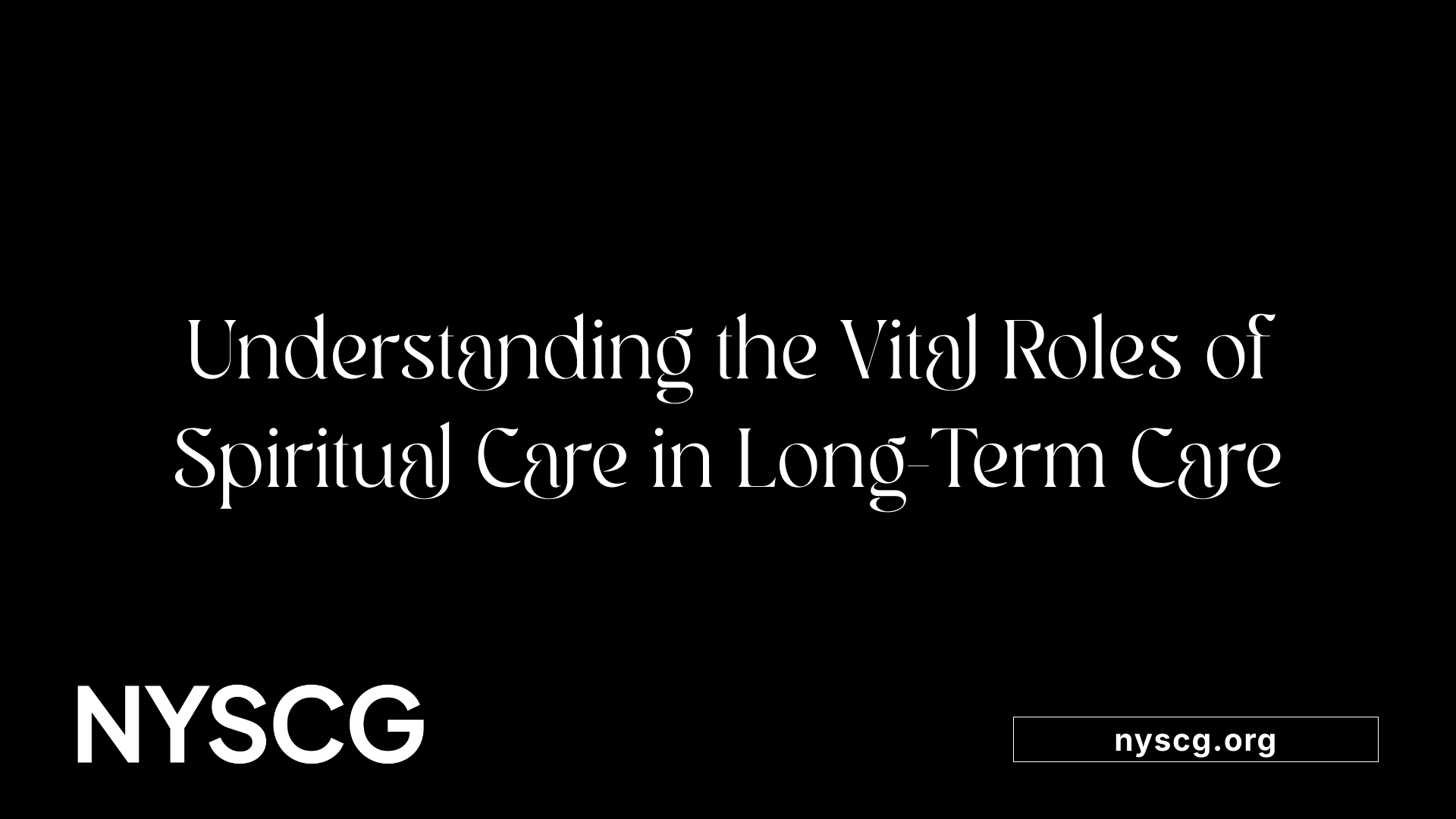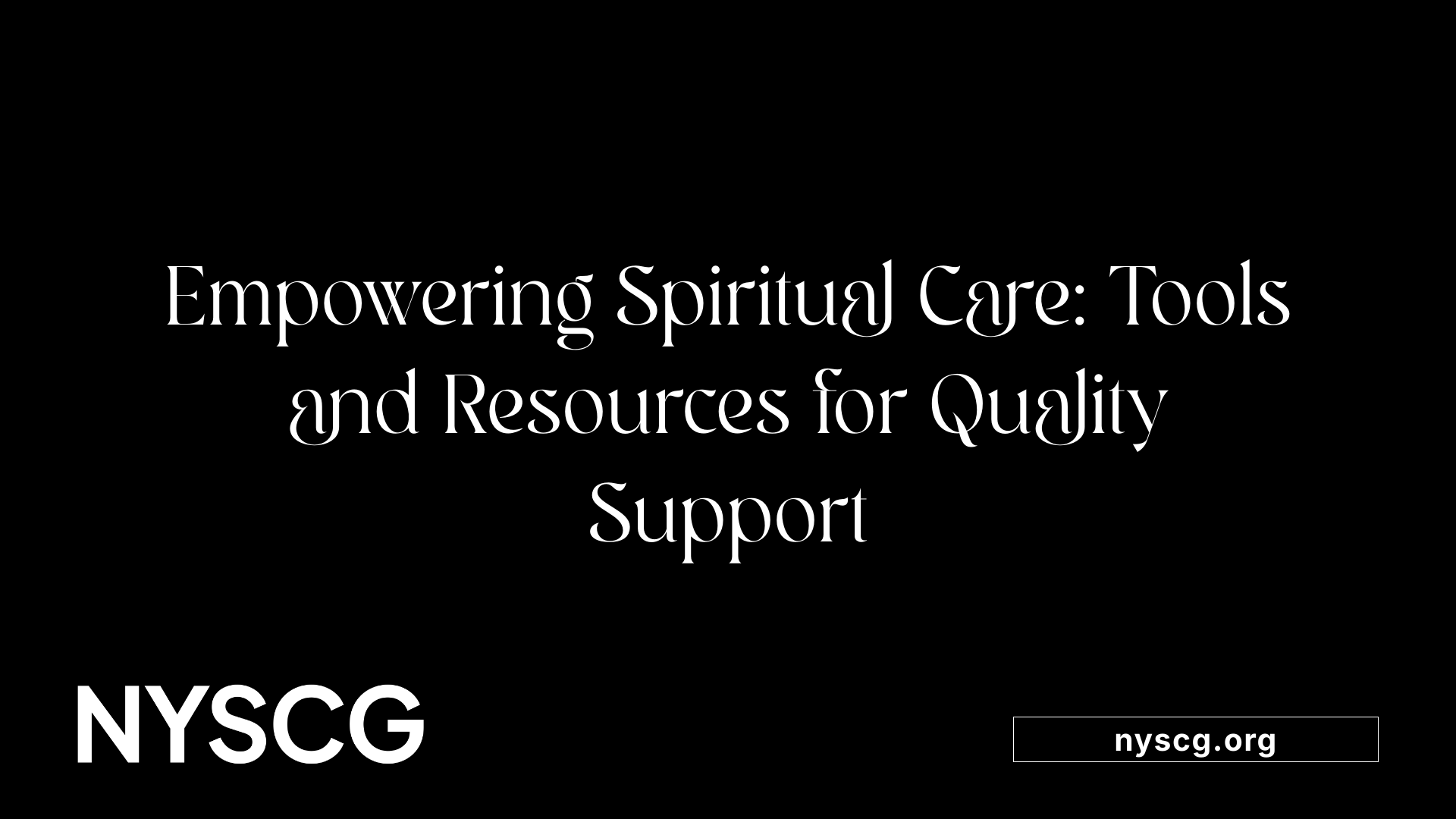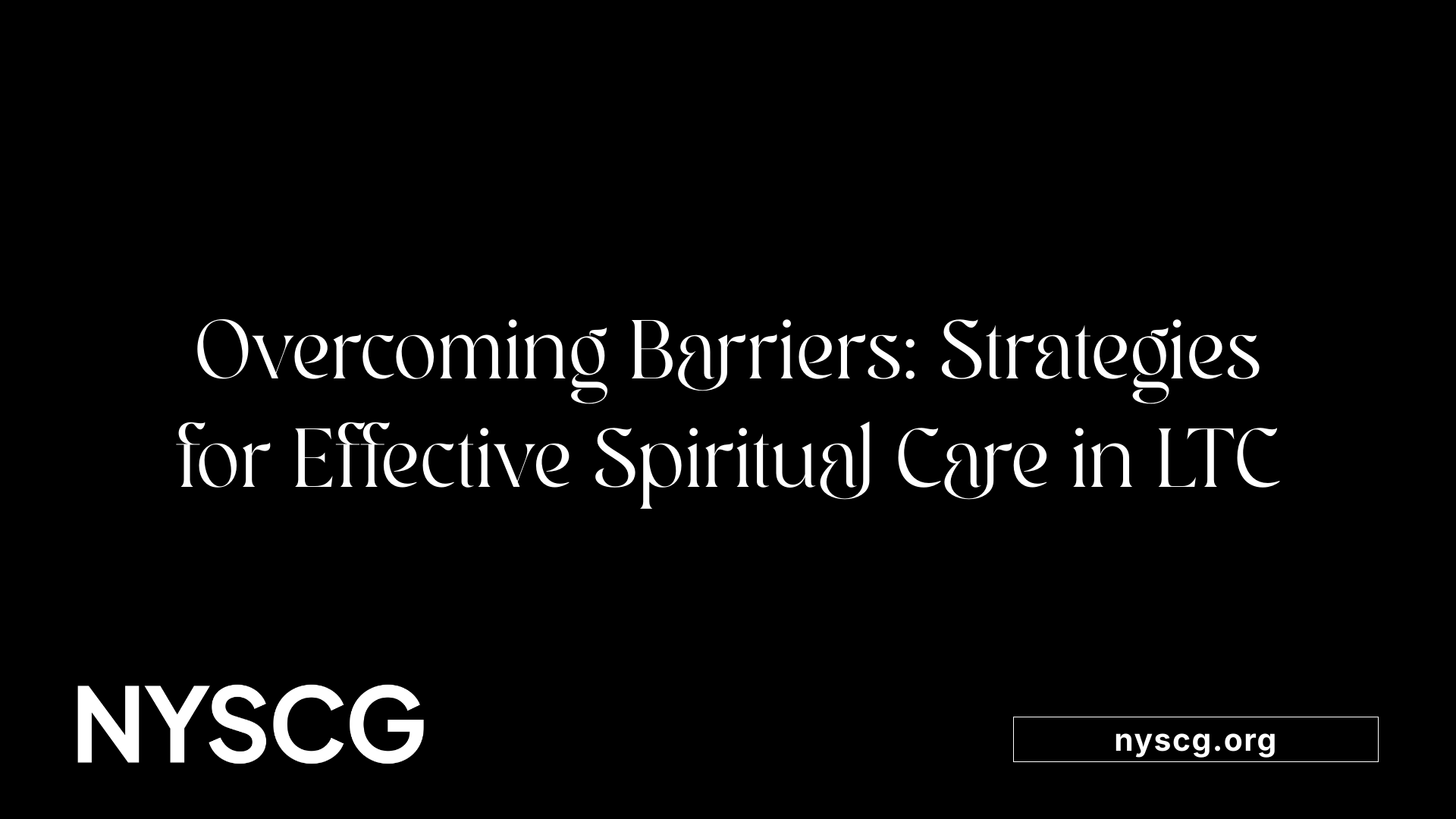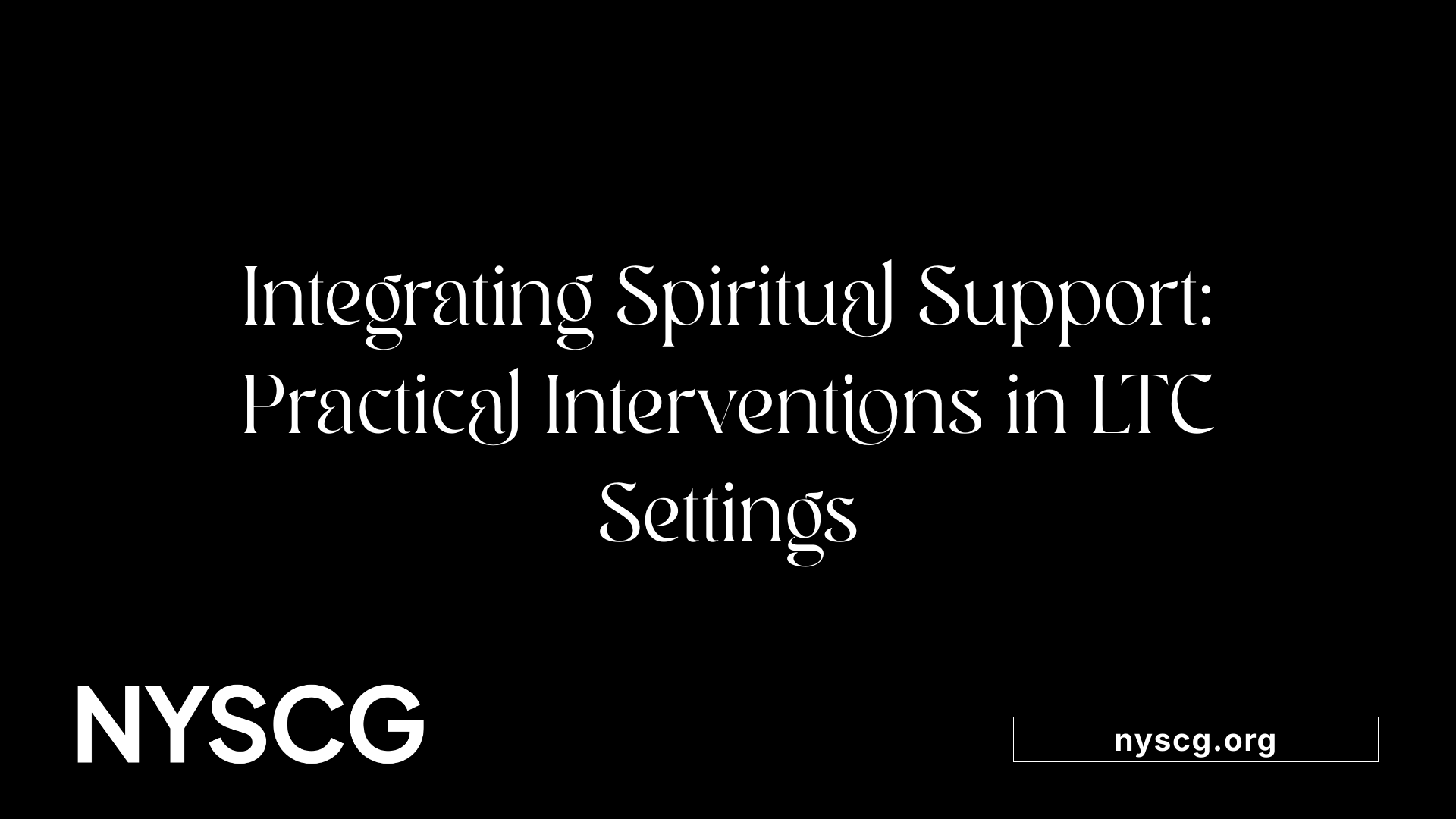Finding Spiritual Care Roles in Long-Term Care Facilities


Spiritual care plays a vital role in enriching the lives of residents in long-term care (LTC) facilities. It addresses fundamental needs for purpose, meaning, connection, and hope, contributing to improved health outcomes and quality of life. However, integrating effective spiritual support remains a challenge, highlighting the need for specialized roles and better organizational strategies.

Spiritual care providers (SCPs), including chaplains and trained spiritual support staff, play a crucial role in supporting the overall wellbeing of residents in long-term care (LTC) settings. Their primary responsibility is to address not only spiritual needs but also emotional and existential concerns, creating a holistic approach to caring for older adults.
One of their core functions is offering individual visits that provide comfort, presence, and a safe space for residents to express their feelings, fears, and hopes. These visits often involve active listening, prayer, and facilitating religious rituals or ceremonies tailored to each person’s beliefs. Whether residents practice faith regularly or seek spiritual connection in other ways, SCPs help them find meaning and peace during their stay.
Assessing spiritual needs is a vital initial step for SCPs. They evaluate residents upon admission and throughout their stay to understand their beliefs, preferences, and spiritual concerns. Based on these assessments, SCPs develop personalized care plans which align with the resident’s values and cultural background. These plans guide interventions and activities designed to support spiritual resilience and quality of life.
End-of-life support is another significant role. SCPs assist residents and families in navigating grief, making peace with difficult decisions, and ensuring their spiritual wishes are respected and fulfilled. Crisis intervention, such as providing comfort during acute health episodes or sudden losses, also falls within their scope.
Beyond individual care, SCPs often organize community or multi-faith activities—like worship services, singing, or meditation sessions—aimed at fostering connectedness and shared purpose among residents. They collaborate closely with healthcare teams, integrating spiritual considerations into overall care strategies.
Despite benefits, the work of SCPs faces challenges: limited staffing, funding constraints, and varying levels of staff understanding about spiritual needs. Nevertheless, their presence significantly enhances residents’ sense of dignity, hope, and resilience.
In sum, spiritual care providers in LTC are vital in nurturing residents’ inner lives, supporting emotional and spiritual peace, and helping them confront aging, illness, and end-of-life issues with dignity and hope. Their work facilitates a compassionate, person-centered approach that values each individual’s spiritual journey.

A comprehensive array of research and practical tools supports the integration of spiritual care in long-term care (LTC) environments. These resources aim to meet the diverse spiritual and emotional needs of residents, thereby improving their quality of life.
Assessment and screening instruments are essential tools used during admission and ongoing care to evaluate a resident’s spiritual needs. These tools facilitate personalized care planning by identifying individual beliefs, values, and preferences. Examples include structured questionnaires and interview guides developed according to international standards.
Guidelines for culturally and spiritually appropriate care provide frameworks for staff to deliver respectful, personalized, and culturally sensitive support. Organizations like the Australian National Guidelines for Spiritual Care and similar frameworks from other regions assist LTC homes in aligning their practices with best standards.
National standards such as the National Consensus Project (NCP) for Quality Palliative Care underpin the delivery of spiritual support by setting clear criteria for assessment, intervention, and staff education. These standards emphasize the importance of a holistic approach that includes spiritual well-being and provide a basis for quality improvement.
Online courses, templates, and practical tools are increasingly available to assist care providers. These educational programs cover topics from basic spiritual care principles to advanced skills for chaplains and healthcare providers. Templates for job descriptions, interview questions for hiring spiritual care providers, and care planning documents support effective staffing and program development.
Research showing the benefits of spiritual support underscores its positive impact on residents’ mental health, satisfaction, and overall well-being. Studies from institutions like Mount Sinai Hospital and Jersey Shore University Medical Center reveal that spiritual care, especially during critical health phases, enhances peace and acceptance, reducing feelings of anxiety and depression.
Overall, these resources aim to empower LTC staff, chaplains, and administrators with the knowledge, skills, and tools necessary to deliver meaningful spiritual care. They foster a person-centered approach that respects individual beliefs, cultures, and life histories, ensuring that spiritual support is an integral part of holistic care models.
| Resource Type | Examples/Focus | Benefits |
|---|---|---|
| Assessment Instruments | Spiritual needs screening tools | Personalizes care, identifies specific resident preferences |
| Care Guidelines | Australian National Guidelines, others | Ensures culturally sensitive, standard-compliant care |
| Standards and Frameworks | NCP, WHO Palliative Care Resolution | Provides quality benchmarks and best practices |
| Online Educational Resources | Courses, webinars, templates | Builds capacity among staff and chaplains |
| Research Evidence | Studies on positive impacts of spiritual care | Validates the importance of spiritual support in LTC |
These resources collectively bolster the capacity of LTC organizations to deliver high-quality, person-centered spiritual care that respects and nurtures the diverse needs of residents, promoting dignity and meaningful lives through holistic support.

Providing spiritual support in long-term care (LTC) settings is vital for enhancing residents' well-being, offering comfort, and supporting their spiritual needs. However, numerous obstacles can hinder effective spiritual care delivery.
One significant challenge is time constraints and staff work overload. Care providers often have tight schedules with numerous responsibilities, making it difficult to allocate dedicated time for meaningful spiritual interactions. This shortage of time can result in neglecting residents' spiritual needs or providing superficial support.
Organizational barriers and resource limitations also play a role. Many LTC facilities lack structured policies, dedicated personnel, or funding for spiritual care services. Without institutional support, spiritual support remains inconsistent and often underprioritized.
Furthermore, insufficient training and confidence among healthcare staff contribute to gaps in service. Staff members may feel unprepared to address spiritual concerns due to limited education about spiritual practices, cultural sensitivities, or assessment techniques. This can lead to discomfort or avoidance of engaging in spiritual conversations.
Adding to these difficulties is the cultural and spiritual diversity among residents. Each individual’s beliefs, traditions, and preferences necessitate personalized approaches. Staff unfamiliar with specific spiritual practices or misunderstandings about spiritual concepts risk providing inappropriate or insensitive support.
Solutions exist to tackle these issues effectively:
By adopting these solutions, LTC facilities can overcome barriers, ensuring residents receive meaningful, respectful, and comprehensive spiritual support. The goal is to embed spiritual care into routine practice, recognizing its vital role in enhancing residents’ quality of life and maintaining their dignity amidst aging and illness.
Providing spiritual and cultural care in long-term care (LTC) settings requires intentional strategies that foster inclusivity, respect, and understanding. Effective organizations develop comprehensive policies and procedures that explicitly prioritize cultural competence and support for diverse spiritual needs. These policies serve as a foundation for consistent practices across all levels of care, ensuring that each resident’s background and beliefs are recognized and respected.
Ongoing staff education and training are essential. Staff need continuous learning opportunities about cultural awareness, spiritual sensitivity, and person-centered approaches. Such education helps reduce misunderstandings and biases, enabling caregivers to provide meaningful support tailored to individual residents.
Another cornerstone is the employment of cultural liaisons or champions within the facility. These designated roles promote an organizational culture that values diversity. Cultural champions advocate for best practices, serve as resources for staff, and facilitate communication between residents, families, and the care team.
A critical step is conducting thorough assessments of residents’ cultural and spiritual needs upon entry into the LTC home. Understanding residents' preferences regarding language, religious practices, dietary requirements, and traditional activities allows for personalized care planning.
Facilities should also implement practices that are culturally tailored. This includes offering language services, traditional foods, and opportunities for residents to participate in cultural, religious, or spiritual activities aligned with their backgrounds. For example, providing multilingual materials or arranging for religious observances helps residents feel connected and respected.
Recruitment plays a vital role. Employing a diverse staff that reflects the resident population’s cultural makeup enhances the capacity to deliver authentic and respectful care. Community engagement efforts further support cultural relevance, such as establishing partnerships with local cultural organizations or faith communities.
By integrating these strategies into their organizational fabric, LTC homes can create an environment that not only meets the diverse needs of residents but also promotes dignity, belonging, and holistic well-being. Such approaches reinforce the core principle that care should be as unique as the residents themselves, fostering an atmosphere of trust and genuine connection.

Spiritual care in long-term care (LTC) environments is a vital aspect of holistic, person-centered care. Its implementation involves multiple strategies that cater to each resident’s unique spiritual, emotional, and religious needs.
One of the primary methods used is face-to-face interactions, including thorough spiritual history taking. During admission or routine visits, staff and spiritual care providers explore residents’ past spiritual experiences, beliefs, and cultural backgrounds. This process helps identify individual preferences for rituals, prayers, or other spiritual activities.
Assessment tools are crucial in aligning care with each resident's specific needs. These standardized forms and questionnaires assist staff in systematically evaluating spiritual pain, sources of hope, meaning, and purpose. Such tools promote consistent, comprehensive understanding, ensuring no resident’s needs are overlooked.
Religious activities and rituals form a core part of spiritual care and include group worship services, prayer sessions, scripture readings, and multi-faith observances. Before the COVID-19 pandemic, many LTC homes hosted communal worship and singing, fostering social connection and spiritual expression.
In response to challenges like social distancing, spiritual activities shifted toward virtual worship services, individualized prayer, and connecting residents with family through technology. Hallway hymn-sings, one-to-one visits, and morale-boosting activities enhanced engagement during restrictions.
Beyond religious practices, spiritual interventions include existential and emotional support. Staff and chaplains facilitate meaningful conversations, reminiscence therapy, and life review, helping residents find peace and reconciliation with their life stories. These approaches address feelings of loss, fear, and grief, providing comfort and hope.
Integration into healthcare teams is essential for comprehensive spiritual care. Multidisciplinary collaboration involves nurses, social workers, chaplains, volunteers, and spiritual care providers working cohesively. Organizational policies support this integration, encouraging regular team meetings and shared care planning that respect residents’ spiritual wishes.
Use of assessment tools and documentation forms ensures spiritual needs are considered in care plans. These records guide tailored interventions, monitor residents' spiritual well-being, and facilitate continuity of care.
However, challenges such as staffing constraints, misunderstandings about the role of spiritual care, and limited funding can hinder effective implementation. Overcoming these obstacles requires dedicated staff training, organizational commitment, and development of best practices.
Efforts are ongoing to standardize spiritual care practices across LTC settings, including online training modules, resource guides, and certification programs for staff and chaplains. These initiatives aim to overcome barriers, ensuring that spiritual support becomes a consistent and integral part of resident care.
In summary, integrating spiritual care in LTC involves a mix of personalized interactions, religious rituals, emotional support, and team collaboration. Through standardized assessment and dedicated resources, LTC facilities can enhance the spiritual well-being of their residents, fostering a sense of peace, dignity, and purpose.
Entering spiritual care roles in LTC facilities involves a strategic approach that combines utilizing practical resources, gaining specialized training, and understanding sector-specific needs.
First, prospective spiritual care providers, such as chaplains or spiritual support staff, can benefit from leveraging resources like sample job descriptions and interview templates. These tools help clarify the qualifications and skills expected, making applications more targeted and effective.
Pursuing specialized training is crucial. Many organizations offer certification for chaplains and spiritual care providers, including theological degrees, clinical pastoral education (CPE), and endorsement by faith communities. Formal credentialing ensures that practitioners have the competency to address residents' psycho-social-spiritual needs, which often extend beyond religious activities to encompass meaning, purpose, connectedness, and emotional support.
Building sector awareness is equally important. Long-term care administrators and staff need to recognize the significance of spiritual care in improving residents' quality of life. Advocacy and education can create opportunities for employment and integration of spiritual support within the care team. Promoting understanding of how spiritual care impacts health outcomes and resident satisfaction can encourage facilities to prioritize hiring qualified providers.
Networking plays a vital role in establishing a presence within the LTC landscape. Connecting with existing spiritual care providers provides insight into the sector's needs and opportunities. Participating in sector-specific workshops, conferences, and online forums can expand professional networks and expose candidates to best practices.
Finally, aligning personal values with sector priorities enhances the likelihood of entering this field. Demonstrating a commitment to holistic, person-centered care that values residents’ spiritual and emotional well-being aligns with recent trends and standards in LTC.
In sum, aspiring spiritual care professionals can find pathways into LTC roles by utilizing practical application tools, obtaining certification, raising awareness among leaders, networking within the sector, and aligning their values with the goal of enriching residents' lives through meaningful support.

Providing spiritual support in long-term care (LTC) settings requires a combination of formal education, specialized training, and specific personal skills. Professionals in this field, often called spiritual care providers or chaplains, must meet certain educational standards and acquire relevant certifications.
Educational Background: Most spiritual care roles require at least a bachelor's degree in fields such as theology, pastoral ministries, psychology, or social work. Many positions prefer or mandate a master's degree, like a Master of Divinity or Theology, which provides deeper theological and pastoral training.
Clinical Pastoral Education (CPE): A core requirement is completing a minimum of 400 hours of clinical pastoral education (CPE) from an accredited program. CPE provides supervised practical experience in providing spiritual care and helps build essential skills like active listening, empathy, and discernment.
Certification and Professional Membership: Professional competence is often verified through certification by reputable organizations. Certification typically involves passing standardized exams, such as those administered by the Spiritual Care Association (SCA), or obtaining credentials from well-known bodies like the Association of Professional Chaplains or the National Association of Jewish Chaplains.
Experience and Recommendations: Candidates usually need to demonstrate practical experience, often over at least 1,000 hours of supervised practice. Additionally, recommendation letters from previous supervisors or clergy, as well as active membership in professional associations, are crucial to establish credibility.
Personal and Interpersonal Skills: Apart from formal qualifications, effective spiritual care providers need strong interpersonal skills. They must be culturally competent, sensitive to diverse spiritual and religious backgrounds, and capable of forming trusting relationships with residents, families, and staff.
Knowledge of Religious Traditions: A thorough understanding of various religious traditions, spiritual practices, and cultural customs is essential. This knowledge enables providers to respect individual beliefs and tailor care accordingly.
Overall, the pathway to becoming a spiritual care professional in LTC involves rigorous education, practical training, certification, and the cultivation of interpersonal and cultural competencies. These elements ensure that providers can deliver compassionate, respectful, and personalized spiritual support to older adults facing complex health and spiritual needs.
Spiritual care plays a vital role in supporting the holistic well-being of residents in long-term care (LTC) facilities. It goes beyond physical health, addressing emotional, existential, and spiritual needs that are essential for maintaining a meaningful quality of life.
Research demonstrates that spirituality significantly contributes to health, recovery, and the overall satisfaction of older adults. It provides residents with a sense of purpose and connectedness, which are crucial during aging, illness, or facing end-of-life issues.
Spiritual support involves practices like prayer, meditation, yoga, rituals, and engagement in sacred or personal traditions. These activities foster feelings of hope, love, peace, and joy, helping residents cope with physical and cognitive challenges. In particular, residents with dementia often find that spiritual support can slow cognitive decline and offer hope amid their difficulties.
Providing culturally and spiritually sensitive care respects individual beliefs, identities, and personal values. It affirms residents' dignity, promoting a sense of respect and understanding that enhances their overall quality of life.
One of the most significant benefits of spiritual care is its ability to reduce feelings of isolation and loneliness. Connection with loved ones, faith leaders, or spiritual care providers creates a sense of belonging, especially important during the COVID-19 pandemic when visitation restrictions increased social disconnection.
Family members and staff also benefit from incorporating spiritual support into care. Families experience reassurance knowing their loved ones’ spiritual needs are acknowledged, and staff can build stronger, trust-based relationships with residents. Incorporating spiritual care into a team approach enhances the overall atmosphere within care settings.
In conclusion, spiritual care is fundamental in LTC because it nurtures resilience, supports emotional coping, respects individual identities, and fosters a community of compassion and understanding. It improves health outcomes and elevates residents' satisfaction and sense of purpose, making it an indispensable aspect of person-centered, holistic care.
Spiritual care plays a fundamental role in supporting the emotional and psychological well-being of older adults in long-term care (LTC). It helps residents find meaning, hope, and a sense of belonging, which are essential for quality of life. Spiritual care addresses deep needs that go beyond physical health, offering comfort during illness, loss, and end-of-life moments.
Integrating spiritual care into LTC can improve overall resident satisfaction and positively influence health outcomes. Residents often find reassurance and purpose through practices like prayer, rituals, meditation, or simply having someone present to listen. During the COVID-19 pandemic, disruptions highlighted the importance of accessible spiritual support, especially when social interactions were limited.
Looking ahead, several strategies can enhance spiritual care delivery in LTC environments. First, establishing dedicated spiritual care teams ensures consistent and specialized support tailored to diverse resident needs.
Organizational support is fundamental to effective spiritual care. Care homes need to recognize spiritual support as a core element of holistic care, embedding it into policies and operational structures. This might involve appointing organizational champions—staff members who advocate for spiritual and cultural competence—and implementing policies that prioritize spiritual care.
Leadership commitment ensures staff understand the importance of spiritual support and allocate the necessary time and resources. Providing ongoing staff education about cultural sensitivity and spiritual needs helps overcome misconceptions and enhances care quality.
Effective spiritual care depends on well-trained providers. Developing comprehensive training programs and certification pathways for chaplains and other spiritual care providers is essential. Certification programs, such as those offered by organizations like the Canadian Association for Spiritual Care, ensure providers are competent in offering sensitive, person-centered support.
Expanding educational resources, including online courses and workshops, can reach a broader range of staff, volunteers, and professionals. This fosters a workforce equipped to address the complex spiritual and cultural needs of residents.
Technology offers innovative solutions for delivering spiritual care, especially when face-to-face interactions are limited. Virtual worship services, video calls with chaplains or faith leaders, and online meditation or prayer resources like FaithFirst can bridge gaps caused by mobility issues or health restrictions.
During the pandemic, virtual activities such as hallway hymn-sings or live-streamed services kept residents engaged and connected. Developing user-friendly digital platforms and training staff to facilitate virtual spiritual support can enhance accessibility and outreach.
Securing dedicated funding and supportive policies is crucial for sustaining quality spiritual care. Advocacy efforts should emphasize the benefits of spiritual support in improving health outcomes, reducing anxiety, and enhancing residents’ dignity.
Legislative frameworks like Ontario’s mandate for spiritual care in LTC are steps forward, but implementation barriers remain. Increased funding can support hiring specialized staff, training programs, and technological infrastructure.
Residents, families, and advocacy groups must champion spiritual care to ensure it remains a priority in care standards. Raising awareness about its benefits can influence policy changes and funding allocations.
| Strategy | Description | Expected Impact |
|---|---|---|
| Dedicated spiritual care teams | Establish specialized teams responsible for spiritual support | Consistent, tailored spiritual interventions |
| Organizational commitment | Embed spiritual care into policies and leadership priorities | Improved integration and resource allocation |
| Expanded training and certification | Develop accessible programs for staff and chaplains | Competent and confident providers |
| Leveraging technology | Use virtual platforms and online resources for support | Increased reach and flexibility |
| Policy and funding advocacy | Influence legislation and funding to prioritize spiritual care | Sustainable support models |
By advancing these areas, LTC providers can ensure that spiritual care becomes an integral, well-supported part of holistic care for older adults. This will promote dignity, comfort, and a sense of purpose for residents as they navigate their later years.
As the landscape of long-term care evolves, the integration of dedicated spiritual care roles becomes essential to meet the diverse emotional and spiritual needs of residents. Recognizing the impact of spiritual support on quality of life, health outcomes, and organizational culture calls for strategic organizational initiatives, professional training, and policy advocacy. Strengthening the presence and competencies of spiritual care providers ensures that residents live with dignity, purpose, and hope, affirming the importance of spiritual resilience in aging.
All you need is the will to make the world a better place.
New York State chaplain group inc. is a tax deductible organization with a federal tax Id number 92-383-4921